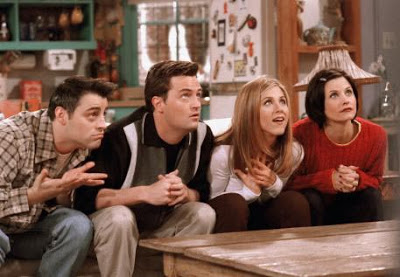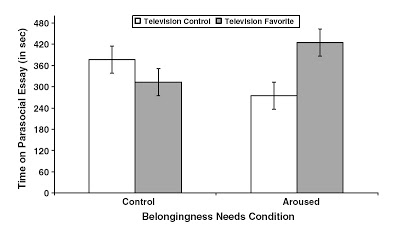Neuroscience


Derrick et al., 2009 replicated this finding in a series of four experiments, all of which supported the Social Surrogacy Hypothesis, i.e.,
Of course, this result was only correlational in nature, so Study 2 manipulated "belongingness needs". Half of the participants were asked to write an essay about a fight with a close other, and the other half were asked to list as many items at home as they could remember. I would have suggested a better neutral essay-writing condition than the residental list, along with a condition to deliberately reduce "belongingness needs" (like an essay about an enjoyable shared experience with a close other). But then again, I'm not a social psychologist, so what do I know?
After the first writing exercise, subjects were asked to write another essay about watching either a favorite show, or whatever was on at the time.

Fig. 1 (Derrick et al., 2009). Length of time spent writing television essay as a function of social needs condition and type of television program.
Study 3 was nearly identical to Study 2, except the Parasocial Essay component was limited to 6 min, and the dependent measures were self-esteem, mood, and feelings of rejection. Again, the predicted Belongingness Needs × Parasocial Essay interactions were obtained for state self-esteem, mood, and a trend for feelings of rejection.
Now the authors need to extend these findings to actually watching a favorite vs. a random TV show, instead of just thinking about watching.
See also:TV Relieves LonelinessDoes Your TV Give You the Warm Fuzzies?
References
Derrick, J., Gabriel, S., & Hugenberg, K. (2009). Social surrogacy: How favored television programs provide the experience of belonging. Journal of Experimental Social Psychology, 45 (2), 352-362. DOI: 10.1016/j.jesp.2008.12.003
Rutherford M, Collins P, Banks T. (1980). Turn It On Again. Duke.

- Can Relationships With Fictional Characters Aid Our Self Development?
"... forming a relationship with an interesting but potentially dangerous character does not present the same obstacles in the narrative world as it might in the physical world.”By guest blogger Robin Abrahams. If you’ve been on the internet...
- People Are Better Teachers Than Teletubbies
In this bit of startling news, Toddlers learn their first words better from people than from Teletubbies.But the initial comparison (discussed in the press release) wasn't between live Teletubbies and live people, or between televised Teletubbies...
- Celebrities With Cns Diseases: Glen Campbell
Glen Campbell, a US cowboy-music entertainer was diagnosed with probable Alzheimer's disease earlier on 2011.He and his spouse have appeared on a number of television and radio shows, including BBC's Today show.Today, they appear on The Ellen...
- Must "c" Tv: Cognitively Demanding Television
It has always struck me as odd that people criticize television watching as mindless entertainment. Hardly mindless. Attentional and memory demands, abstraction, requirements imposed by presentation of diverse vantage points, fast pacing, and so on, all...
- Tv 2.0 For Babies?!
Last Tuesday's Times reports on a study by Vanderbilt University researchers suggesting that interactive television can actually be good for children's development. Earlier research showed that 3-5 year olds who watched Blues Clues "score better...
Neuroscience
"All I need is a TV show..."

A Warm TV Can Drive Away Feelings of Loneliness & RejectionStudies find that illusionary relationships with TV characters can give us real pleasureRelease Date: April 22, 2009BUFFALO, N.Y. -- Not all technology meets human needs, and some technologies provide only the illusion of having met your needs.But new research by psychologists at the University at Buffalo and Miami University, Ohio, indicates that illusionary relationships with the characters and personalities on favorite TV shows can provide people with feelings of belonging, even in the face of low self esteem or after being rejected by friends or family members.The findings are described in four studies published in the current issue of the Journal of Experimental Social Psychology [Derrick et al., 2009].However, after some sleuthing to uncover the classical literature on the topic, I've discovered that Rutherford et al. (1980) described this phenomenon nearly 30 years ago:

You're just another face that I know from the TV show
I have known you for so very long I feel you like a friend
Can't you do anything for me, can I touch you for a while
Can I meet you on another day and we will fly away
Turn It On Again
------Rutherford et al. 1980
I have known you for so very long I feel you like a friend
Can't you do anything for me, can I touch you for a while
Can I meet you on another day and we will fly away
Turn It On Again
------Rutherford et al. 1980
Derrick et al., 2009 replicated this finding in a series of four experiments, all of which supported the Social Surrogacy Hypothesis, i.e.,
...that parasocial relationships provided by television programs can yield the experience of belonging. Specifically, we drew three primary predictions from the Social Surrogacy Hypothesis. If favorite television programs can yield the experience of belonging, we hypothesized that (1) events that typically elicit belongingness needs (e.g., threats to a relationship, a rejection experience) would elicit a desire to experience a favored television program, (2) thinking about a favored television program could buffer against threats to real-world belongingness, and (3) thinking about a favored television program should reduce the accessibility of loneliness related concepts.In Study 1, 701 college students completed the lonely activities scale and the likelihood of feeling lonely scale. These scales were developed for the current study by asking 12 other undergraduates to list non-social activities that people might do when they feel lonely. A final list of 31 activities was given to the larger group, who were asked to rate the items on a scale of 1 (would definitely not do) to 7 (definitely would do). The top six items were:
- Listen to music – a particular CD/tape
- Watch television – a favorite TV program
- Sleep
- Surf the web
- Eat
- Exercise
Of course, this result was only correlational in nature, so Study 2 manipulated "belongingness needs". Half of the participants were asked to write an essay about a fight with a close other, and the other half were asked to list as many items at home as they could remember. I would have suggested a better neutral essay-writing condition than the residental list, along with a condition to deliberately reduce "belongingness needs" (like an essay about an enjoyable shared experience with a close other). But then again, I'm not a social psychologist, so what do I know?
After the first writing exercise, subjects were asked to write another essay about watching either a favorite show, or whatever was on at the time.
Participants in the Favored condition wrote about a time they watched their favorite television program, describing it in as much detail as possible. Participants in the Control condition wrote about a time when they had watched “whatever was on” television, describing it in as much detail as possible. Participants were asked to describe as much as they could about the content of the program and their experience watching it. Length of time writing this Parasocial essay served as the primary dependent measure.Lo and behold, the predicted Belongingness Needs × Parasocial Essay interaction was obtained:

Fig. 1 (Derrick et al., 2009). Length of time spent writing television essay as a function of social needs condition and type of television program.
Study 3 was nearly identical to Study 2, except the Parasocial Essay component was limited to 6 min, and the dependent measures were self-esteem, mood, and feelings of rejection. Again, the predicted Belongingness Needs × Parasocial Essay interactions were obtained for state self-esteem, mood, and a trend for feelings of rejection.
Now the authors need to extend these findings to actually watching a favorite vs. a random TV show, instead of just thinking about watching.
See also:TV Relieves LonelinessDoes Your TV Give You the Warm Fuzzies?
References
Derrick, J., Gabriel, S., & Hugenberg, K. (2009). Social surrogacy: How favored television programs provide the experience of belonging. Journal of Experimental Social Psychology, 45 (2), 352-362. DOI: 10.1016/j.jesp.2008.12.003
Rutherford M, Collins P, Banks T. (1980). Turn It On Again. Duke.

All I need is a TV show, that and the radio
Down on my luck again, down on my luck again
I can show you I can show you some of the people in my life
I can show you I can show you some of the people in my life
It's driving me mad just another way of passing the day
I, I get so lonely when she's not thereTurn It On Again
------Rutherford et al. 1980
Down on my luck again, down on my luck again
I can show you I can show you some of the people in my life
I can show you I can show you some of the people in my life
It's driving me mad just another way of passing the day
I, I get so lonely when she's not thereTurn It On Again
------Rutherford et al. 1980
- Can Relationships With Fictional Characters Aid Our Self Development?
"... forming a relationship with an interesting but potentially dangerous character does not present the same obstacles in the narrative world as it might in the physical world.”By guest blogger Robin Abrahams. If you’ve been on the internet...
- People Are Better Teachers Than Teletubbies
In this bit of startling news, Toddlers learn their first words better from people than from Teletubbies.But the initial comparison (discussed in the press release) wasn't between live Teletubbies and live people, or between televised Teletubbies...
- Celebrities With Cns Diseases: Glen Campbell
Glen Campbell, a US cowboy-music entertainer was diagnosed with probable Alzheimer's disease earlier on 2011.He and his spouse have appeared on a number of television and radio shows, including BBC's Today show.Today, they appear on The Ellen...
- Must "c" Tv: Cognitively Demanding Television
It has always struck me as odd that people criticize television watching as mindless entertainment. Hardly mindless. Attentional and memory demands, abstraction, requirements imposed by presentation of diverse vantage points, fast pacing, and so on, all...
- Tv 2.0 For Babies?!
Last Tuesday's Times reports on a study by Vanderbilt University researchers suggesting that interactive television can actually be good for children's development. Earlier research showed that 3-5 year olds who watched Blues Clues "score better...
